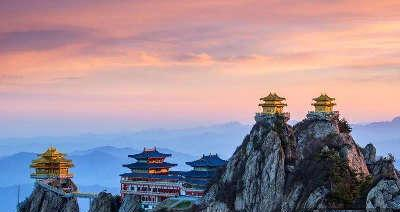申报地区:栾川县 2011年12月 第3批

公元前478年,周敬王41年9月的一日早晨,老子登上了伏牛之巅,因景室秀美而在此归隐。其后老子一方面修炼布道,一方面收徒讲学,善男信女感恩不断,栾川民间多有老子施药救人的传说,如“正月二十三,老君来散丹,家门贴金牛,四季保平安”等。
公元前411年威烈王姬午14年4月8日,老子在古鸾景室山奇石林莲花台坐化升天,正值160岁华诞。后人为纪念先贤于老子圆寂的洞府祭奠神灵,并建立庙宇。值此,有了栾川每年四月八日君山庙会的传统。每年这一天,人们和信徒一起登山祭奠老子,缅怀先贤,感念其布道之德、施药之恩。传延至今,已逾千年,而香客不绝、祭者不断。
In 478 BC, on the morning of September in the 41th year of King Jing's reign in the Eastern Zhou Dynasty, Lao Tzu climbed to the top of Funiu Mountain, awed by the beautiful In scenery, decided to retire in the mountain. Afterwards, Lao Tzu conducted self-cultivation, sermons and taught disciples there. Folks in Luanchuan County had legends that Lao Tzu applied medicine to save people, as said in the proverbs "In the 23th of first lunar month, Lao Tzu outgave medicine. The image of gold bulls posted on the door made us safe and sound all the year. In 411 BC, Lao Tzu ascended to heaven at the lotus platform of the ancient Stone Forest, at his age of 160. Later generations worship the sage and built temples where Lao Tzu died to commemorate him. The Junshan Temple Fair was celebrated on every April 8th. On this day, the disciples would climb the mountain to pay homage to Lao Tzu cherish the sages and show gratitude for his preaching and medicine. The tradition has been passed down for more than a thousand years, with endless pilgrims.
